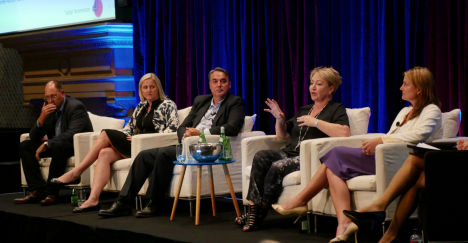Senior agency staff ‘earning themselves out of a job’, claims PRIA consultancy group chair
The chairman of the Public Relations Institute of Australia’s Registered Consultancy Group has suggested PR agencies are sometimes happy to see the back of senior staff because they are not worth the money they are paid and are “earning themselves out of a job”.
Adam Benson told the CommsCon conference, in Sydney yesterday, that high staff turnover rates can sometimes be a blessing for agencies if the right people quit.
Speaking on a panel of industry leaders, Benson said there are “people you want to keep” but others, including those who receive annual pay rises but who have outgrown their usefulness, who companies are pleased to see leave.



The flip side of this discussion is that senior PR practitioners will earn a lot more money by leaving these agencies and working as a consultant. They will also have a much better work/life balance.
Many clients are beginning to understand that when they employ large PR agencies with large fees to match, often they get lumped with junior staff who have no clue. Not only that, most have no established relationships with media and other influencers.
There are real benefits to be had by employing consultants who’ve left big agencies. They have less overheads, so therefore they are more affordable to engage. They also have years of experience and relationships that a 23 year old agency employee could never match.
So if I understand correctly there’s a talent shortage but the sooner we can put older practitioners out to pasture the better.
Is that your key message Adam?
The other flip side is senior PR practitioners earn a lot more money going in-house!
#PRFail
what an utterly bizarre position to advocate – that the industry wants people to leave “because they’re senior and we can’t say no to a pay rise request”
instead of sustaining an environment where you are continually creating competition for yourself by letting senior people go, how about you manage your people better by motivating them and linking payrises to productivity improvements/billings and other metrics?
I agree with Drew Lambert and that was certainly my position when I was made redundant during the GFC.
As a freelance consultant I also often see corporates fall to the charms of the senior staff only to end up with a junior once the ink dries. I’ve even lost clients who thought I was too small as a soloist, only to have them eventually return and ask me to fix the mess left by their decision to go with a bigger agency.
“PRIA president and national board member John Vineburg” – I thought Mike Watson was PRIA president – or has there been another spill this week at PRIA?
Those at the vanguard of public relations appreciate the industry is unrecognisable now compared with five years ago. Relying on concepts like Grunig’s Four Models of Public Relations and the subsequent Excellence Model from the 80s and 90s just won’t cut it. The fragmenting media landscape changed that. More significantly social media has changed that, forever.
PR practitioners need to keep up with their professional development throughout their careers to ensure they’re relevant today. Alastair McCapra CEO of the Chartered Institute of Public Relations in the UK recently commented: “Qualifications are great but knowledge degrades. If we are not [continuously] learning and developing ultimately we can’t be professional because we’ll end up trying to solve tomorrow’s problems with yesterday’s techniques.”
It does seem crazy to link pay rises to tenure rather than ability, relevance, and other metrics. Linking it with CPD would be a start. Not enforcing CPD means you get good PR practitioners and bad ones. Those who strive to innovate. To push the discipline forward. But equally those who get stuck in a moment in time. Fossilised.
Hi Scott,
It should have read PRIA NSW president. Copy now corrected.
Cheers
Nic – Mumbrella
“Never wrong for long” cheers Nic